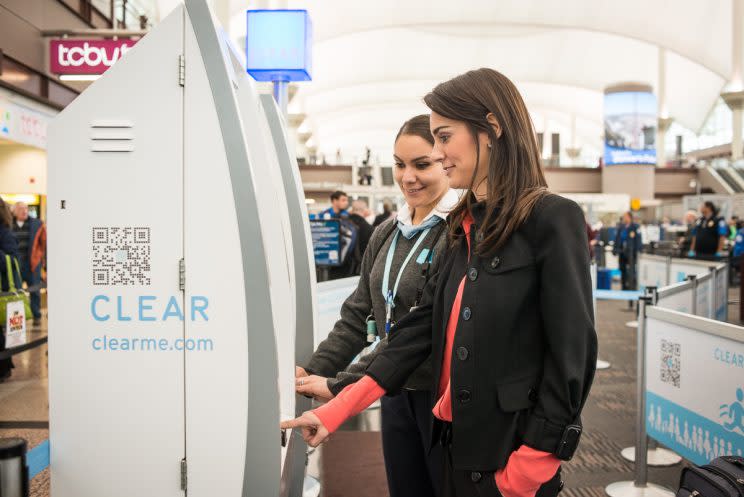This company will change how you go through airport security...for a price

Airport security lines are arguably one of the worst parts of flying. Record numbers of passengers and longer wait times are standard now. Arriving at the airport two hours before take-off may not be enough anymore as seen by news reports of passengers missing their flights because of long security lines at airports in Chicago and Atlanta.
It’s frustrating, and for the most part, passengers are at the mercy of the TSA. But one company is giving travelers an opportunity to take back some control.
For about $15 a month, Clear uses biometrics (identification and authentication using personal traits) to screen passengers and seamlessly move them through the airport security process.
After registering online, you have to visit an enrollment center to provide a photo, fingerprints and an iris image. If approved, your next trip to the airport will be a breeze as you bypass everyone standing in line and stroll through the Clear lane. There, you’ll scan your fingerprints or eye iris (instead of showing your ID) and head straight to the screening area.
How is this different than TSA precheck? In reality, the two services are actually quite different.
TSA precheck costs $85 for a 5-year membership, allows you to use an expedited lane, and you don’t have to remove your shoes, laptop, etc., before going through the body scanner. It’s available at 180 airports nationwide, and children 12 and under can use it with their parents for free.
Clear costs $179 a year (about $15 a month), but if you’re enrolled, your spouse can join for just $50 a year. Children 18 and under can use the Clear lane for free if a parent has a membership, and you can try the service free for one month before fully committing. Clear helps you to skip the lines before you reach the body scanner, but unlike TSA precheck, you will still have to take off your shoes and remove toiletries from your bag before sending items through the X-ray machine.

“Clear gives people the opportunity to have another means of identity verification and allows them to bypass long lines and go directly to the physical screening process,” says Dave Cohen, the Chief Administrative Officer at Clear. “TSA Precheck helps to expedite the physical screening, so 40% to 50% of our clients use both, they are complementary services.”
Clear started in 2010, and is currently in 13 US airports: Austin (AUS), Baltimore (BWI), Dallas/Fort Worth (DFW), Denver (DEN), Houston (IAH and HOU), Las Vegas (LAS), Miami (MIA), Orlando (MCO), San Antonio (SAT), San Francisco (SFO), San Jose (SJC), and Westchester County (HPN).
Over the next couple of weeks, Clear will open checkpoints at airports in Seattle (SEA) and Washington (IAD and DCA), and Cohen predicts that Clear will be available at a total of 20 airports by the end of the year. The company also just announced a partnership with Delta Airlines (DAL) that will help to spread the word its services.
“We’ve been working for the past several years to grow Clear, and this partnership with Delta is an immediate validator,” said Cohen. “When Delta says that Clear is a great way to serve customers, airports notice that.” As an added bonus, Delta Skymiles members will get a discounted Clear membership.
While Clear can help you cut down on the time you spend in line, there are also some efforts being made to help the physical screening process run more smoothly.

On July 5, The Transportation Security Administration (TSA) announced a partnership with American Airlines (AAL) that should speed up the security screening process at airports. The plan is to install automated screening lanes that take on some of the manual tasks completed by travelers. For instance, the new automated belt will draw bins into the X-ray machine and automatically return bins back to the queue once you have retrieve your belongings. The initiative will also install CT scanners at American Airlines hubs around the nation. These machines contain 3D imaging technology, which is currently used for checked baggage but not for carry-ons. This introduction might make it possible for people to leave liquids, gels, aerosols, and laptops inside their carry-on bags.
American Airlines will join Delta, which is already testing these automated lanes, at Atlanta’s Hartsfield-Jackson as part of a pilot program with the TSA. Delta says the new lanes can process five travelers at once, cutting processing time by 30%.
As for Clear, it currently has about 500,000 users, and hopes that number will rise as travelers grow more frustrated with airport security efficiency.
“The TSA is dealing with a growing traveling population and a threat profile we’ve never seen before. They have a difficult job,” says Cohen. “We want to be as good a partner as possible, and if you can automate the process and use tested technology to provide faster service, why wouldn’t you?”
Would you pay to skip airport security lines? Email us at [email protected].